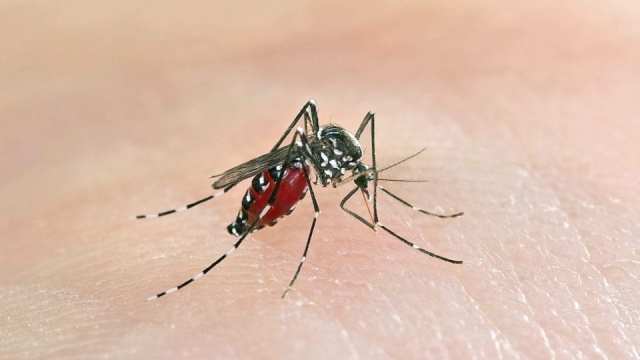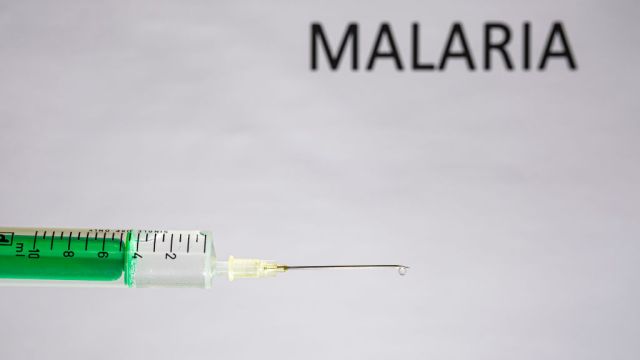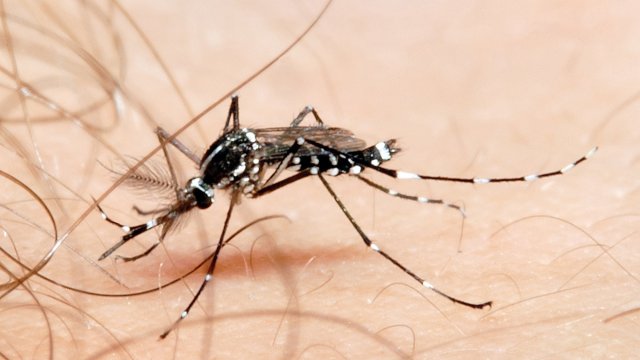Passengers getting off the Eurostar at London St Pancras station this summer may not have noticed the tiny black cylindrical object at the end of the platform.
But these simple devices are traps that are at the forefront of Britain’s newest battle: against invasive mosquito species that can settle in the country and spread diseases that are more common in tropical areas, such as dengue fever and the Zika virus.
The tiny insects cannot travel long distances on their own but instead hitch a ride in vehicles, trains and airplanes, making ports of entry, such as airports, sea freight terminals and Eurostar stations, a focus of scrutiny in the UK.
Climate change, with increasingly hot summers in Europe pushing temperatures above 40°C in the UK last July, is pushing one species in particular, the Asian tiger mosquito – so called because it has black and white stripes – further north.
this mosquito, Aedes albopictus, is a vector, or carrier, of dengue, yellow fever, Zika and chikungunya. There were no detections of mosquitoes in England prior to 2016 but since then there have been six separate detections in South East England. While there are no signs yet of them breeding here and becoming established, allowing the spread of disease.
But the UK government’s contingency plans recently warned that there was an “immediate threat” of mosquitoes becoming established and that the problem of vector-borne diseases such as dengue “could escalate and spread to the UK very soon”.
And after a major outbreak in France last year of scarlet fever – a disease also known as “broken bone fever” which can cause vomiting, severe headaches and in rare cases can be fatal – scientists fear that local transmission of the virus could occur in England in the next few years.
The Asian tiger mosquito is now breeding in Paris and is expected to thrive in northern France in the next few years, creating a potential new route for introduction to the UK, according to a recent government report.
During his appearance on the Covid investigation last week, the UK’s chief medical officer, Sir Chris Whitty, listed vector-borne diseases as one of the UK’s increasing pathogen risks.
Although respiratory virus outbreaks are still seen as a bigger threat to the country, Governments, scientific institutions and the pest control industry are not taking any chances.
Lady Hallett’s inquiry has heard days of evidence of how Britain was too focused on the flu as a major risk to the nation’s health, without adequate preparation for another viral outbreak.
Last week, the European Center for Disease Prevention and Control issued a warning about the increased risk of mosquito-borne disease in Europe due to the spread of the Asian tiger mosquito – directly linking it to the trend of more heat waves and flooding on the continent.
It said: “This creates more favorable conditions for such invasive mosquito species Aedes albopictus And Egyptian temple (different species carrying the same virus). In 2013, Asian tiger mosquitoes were found in 114 regions in eight European Union countries, but this number has increased to 337 regions in 13 countries.
The alert also warns of West Nile virus – which can cause fever and fatigue and in rare cases brain swelling, meningitis and even death – which is carried by different mosquitoes, Culex pipiens. While this species is already present in the UK, the virus is not present – but conditions that allow local transmission, such as rising temperatures and recognition by migratory birds, could occur in the coming decades, scientists believe.
Malaria is seen as a lower risk in the UK, but increasingly hot summers could create the right conditions for a comeback decades after the disease has been eradicated from the country.
This week, the US reported its first cases of locally-acquired malaria in North America for the first time in 20 years — including four in Florida and one in Texas.
Malaria, which is more common in low-lying areas, is also spreading to higher altitudes in Africa, placing additional strain on local public health systems. That Anopheles the species of mosquito that carries malaria is native to the UK, but the parasite it carries only breeds at consistently high temperatures.
Andrea Ammon, director of the ECDC, said: “In recent years we have seen the geographic spread of invasive mosquito species into previously unaffected areas in the EU/EEA.
“If this continues, we may see more cases and possible deaths from diseases like dengue, chikungunya [which can also be fatal] and West Nile fever. Efforts need to focus on ways to control mosquito populations, increase surveillance and enforce personal protective measures.”
Last year there were 1,133 cases of West Nile virus infection in Europe, most of which were acquired locally rather than in infected travelers, and 92 deaths.
More than 700 of these cases have occurred in Italy, 286 in Greece, 47 in Romania, 16 in Germany, 14 in Hungary, with other reports of infections in Croatia, Austria, France, Spain, Slovakia and Bulgaria.
In 2022, there were 71 cases of locally acquired dengue fever in Europe, the same number recorded over the previous 11 years. About 65 of the 2022 cases are in France, while six are in Spain. There have also been cases recorded in Croatia and Italy in previous years.
In Italy, there were 436 cases of chikungunya in 2017, while 2019 saw the first case of locally acquired Zika in southern France.
Rentokil Initial, a pest control company, anticipates an increase in mosquitoes in new areas of the world that can carry disease: they have set up a “blood room” in the UK’s innovation center that passes donated blood from humans to insects in a laboratory to study their behavior.
To prepare for the increased threat from vector-borne diseases, the UK Health Safety Agency (UKHSA) has conducted surveillance of the Asian tiger mosquito in South East England but this work is being stepped up.
UKHSA’s recently published 10-year science strategy promises to “strengthen our vector surveillance to ensure that we identify as early as possible any new threats arriving in the country”.
UKHSA scientists worked with local authority pest control officers and harbor health officers in parts of southern England and near harbors and airports to set mosquito traps and analyze samples.
Increased surveillance is also taking place at truck stops, road service stations and distribution warehouses if mosquitoes use trucks carrying goods from the continent as routes to the UK.
Surveillance also includes monitoring cases of British dengue fever and other diseases caught in tropical countries – given that the locally acquired route of transmission is usually the Asian tiger mosquito which settles in an area and feeds on the blood of infected travellers.
Professor Isabel Oliver, chief scientific officer at UKHSA, said: “Most of the illness and death caused by mosquito-borne diseases occurs in the tropics, but unfortunately, there is an increased risk posed by mosquitoes invading the UK.
“Factors behind this increased risk include climate and environmental change, globalization of travel and trade, and changes in land use. While we have yet to see cases of diseases like dengue and acquired West Nile virus in the UK, in recent years we have seen small outbreaks of infection as close as France.
“In addition to monitoring human infection, UKHSA conducts surveillance of mosquitoes and other vectors of infection to monitor risks to population health so we can identify and make changes quickly and effectively.
“We have strengthened surveillance of these vectors through the establishment of our Center for Climate Security and Health and continue to coordinate field-based research on the impact of climate change and the environment on vectors and their pathogens.”
The 2020 emergency plan by Public Health England, UKHSA’s predecessor, said “despite the threat associated with other vectors, mosquito-borne infections are considered the immediate threat”.
The Wellcome Trust, a health research charity, is developing an open source database to track climate-affected infectious diseases, and is funding projects around the world including at Imperial College London that will enable researchers to input disease projections and investigate, through simulation, public health actions. required.
Felipe Colón, lead technology at Wellcome, said: “Climate change poses various risks to human health, including the spread of infectious diseases.
“As temperatures warm, more places around the world become suitable for disease-carrying mosquitoes.
“Currently, there is a shortage of tools to model and predict how our changing climate will impact the spread of disease, leaving decision makers unprepared and communities at risk.
“Wellcome supports research to help revolutionize the way we understand, predict and protect against climate-sensitive diseases such as dengue, malaria and cholera.
“These tools will be especially important in places where the current burden of disease is low and health care systems may not be prepared for future outbreaks – such as high altitude areas, helping to improve preparation and save more lives.”
A scientific work published in International journal of environmental research and public health in 2020 recommended that UK local authorities and emergency planners develop a local mosquito control plan.
Dr Steven White, theoretical ecologist at the UK Center for Ecology and Hydrology, said: “One of the main vectors of the mosquito-borne disease dengue, Aedes albopictusspreading worldwide due to climate change and globalization bringing it to new countries.
“The UK currently has no breeding population, but there have been some recent attacks detected in South East England and should therefore be monitored.
“Currently, there is little risk to the UK according to our modeling work, however, climate change is likely to increase the likelihood that these mosquitoes may survive in the UK in the future, and bring with them the possibility of a dengue outbreak.”
Dr White said it was “very likely West Nile virus would make its way into the UK in the near future”. He added: “Our modeling research indicates that in the coming decades the climate will be suitable for transmission to humans. Therefore, the West Nile virus is something that the UK needs to plan for.
“In the future, given that climate change will indeed impact the risks posed by mosquitoes, there will need to be increased funding available to researchers and health professionals to mitigate these risks.”
#tiger #mosquito #coming #British #prepared #tropical #diseases #brought


